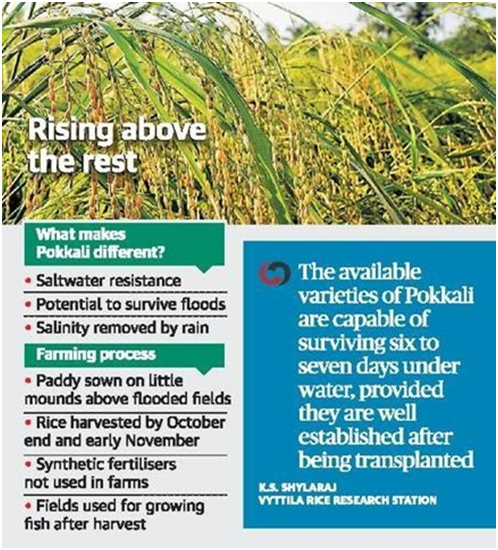Pokkali Farming

(GS-I: Geography; GS-III: Agriculture, Environment; Essay – Traditional Knowledge & Sustainability)
🌾 What is Pokkali Farming?
-
A traditional, organic, and climate-resilient farming system practiced in the coastal wetlands of Kerala, particularly in Ernakulam, Alappuzha, and Thrissur.
-
Recognized as a Globally Important Agricultural Heritage System (GIAHS) by FAO, especially as part of the Kuttanad below-sea-level farming system.
Key Features:
| Aspect | Details |
| Crops | Pokkali rice (salt-tolerant) during monsoon; prawn/shrimp farming post-monsoon |
| Farming Type | Agro-aquaculture rotation – rice in wet season, aquaculture in dry season |
| Symbiosis | Rice stalks feed prawns; prawn excreta fertilizes rice fields |
| Organic & Low Input | No chemical fertilizers or pesticides used |
| Seasonality | June–October (Paddy) and November–April (Prawns) |
Significance:
Ecological & Environmental:
-
Salt-tolerant & flood-resistant variety – resilient to climate change and rising sea levels
-
Enhances soil fertility and natural biodiversity
-
Acts as a carbon sink and mitigates coastal erosion
Cultural & Economic:
-
Deeply rooted in Kerala’s coastal heritage
-
Supports local livelihoods, food security, and rural economy
-
Provides nutritious, chemical-free food
Global Recognition:
-
Recognized under FAO’s GIAHS for:
-
Biodiversity conservation
-
Cultural significance
-
Sustainability and local knowledge
-
Research & Development:
-
Ongoing efforts by Kerala Agricultural University, MS Swaminathan Foundation, and others to:
-
Improve productivity
-
Adapt to mechanization
-
Preserve genetic traits of Pokkali rice
-
Challenges:
-
Labour shortages
-
Low market returns
-
Lack of technology suited to soggy, waterlogged fields
-
Shrinking interest among younger generations
Conservation Measures:
-
Support from local cooperatives, NGOs, and research bodies
-
Educational and awareness campaigns promoting Pokkali as a climate-smart solution
-
Government backing via:
-
Paramparagat Krishi Vikas Yojana (PKVY)
-
Climate Adaptation Plans
-
UPSC Relevance:
Prelims:
-
Location: Kerala
-
Type: Rice–prawn rotational organic farming
-
Recognition: FAO’s GIAHS; GI-tag for Pokkali rice
Mains (GS-I/III):
-
Traditional farming as a model of climate-resilient agriculture
-
Agro-ecological practices in vulnerable ecosystems
-
Linkage of food security, cultural heritage, and sustainability
✍️ Essay Theme Applications:
-
“In harmony with nature: Traditional knowledge and future sustainability”
-
“Climate-resilient agriculture: Blending tradition and innovation”
